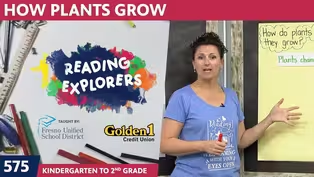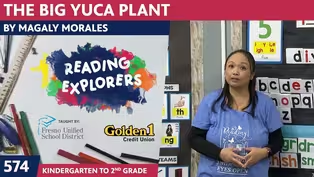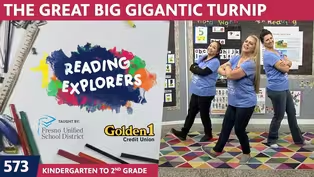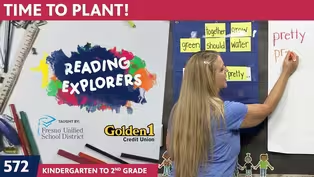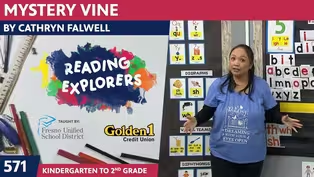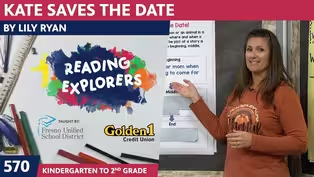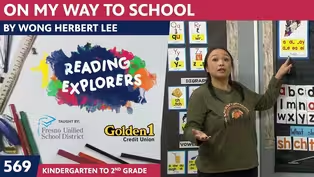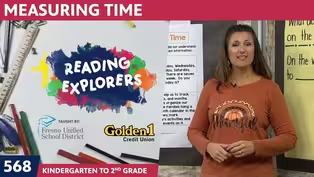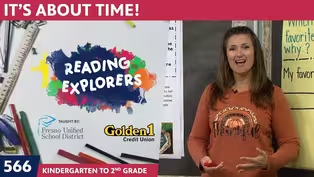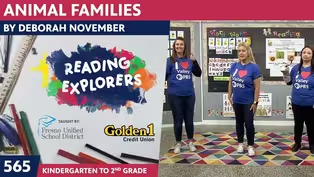
3-343: Identifying Words with Suffix 'less' 'ful' and 'able'
Season 3 Episode 238 | 14m 18sVideo has Closed Captions
Join Mrs. Nix at Camp Discovery!
Third Grade teacher, Mrs. Nix, welcomes students back to Camp Discovery, a fun learning space packed with reading adventures & fun games!
Problems playing video? | Closed Captioning Feedback
Problems playing video? | Closed Captioning Feedback
Reading Explorers is a local public television program presented by Valley PBS

3-343: Identifying Words with Suffix 'less' 'ful' and 'able'
Season 3 Episode 238 | 14m 18sVideo has Closed Captions
Third Grade teacher, Mrs. Nix, welcomes students back to Camp Discovery, a fun learning space packed with reading adventures & fun games!
Problems playing video? | Closed Captioning Feedback
How to Watch Reading Explorers
Reading Explorers is available to stream on pbs.org and the free PBS App, available on iPhone, Apple TV, Android TV, Android smartphones, Amazon Fire TV, Amazon Fire Tablet, Roku, Samsung Smart TV, and Vizio.
Providing Support for PBS.org
Learn Moreabout PBS online sponsorshipMore from This Collection
Valley PBS and Fresno Unified School District have partnered with Golden 1 Credit Union to create Reading Explorers Lessons for grades Pre-Kindergarten through Third grade. The daily lessons will be taught by Fresno Unified School District teachers and are created to help students practice their reading skills and reinforce lessons during distance learning.
Video has Closed Captions
Learn about the life cycle of a plant on Reading Explorers. (26m 39s)
K-2-574: The Big Yuca Plant by Magaly Morales
Video has Closed Captions
Join the Reading Explorers as we adventure into a new book The Big Yuca Plant. (26m 30s)
K-2-573: The Great Big Gigantic Turnip
Video has Closed Captions
What will happen at The Great Big Gigantic Turnip? (26m 30s)
K-2-571: Mystery Vine by Cathryn Falwell
Video has Closed Captions
The Bell has rung and the Valley PBS Classroom is open once more. (26m 32s)
K-2-570: Kate Saves The Date by Lily Ryan
Video has Closed Captions
Mrs. Nix, Mrs. Hammack and Mrs. Vang are glad to have you join her for a new day. (26m 32s)
K-2-569: On My Way To School by Wong Herbert Lee
Video has Closed Captions
Mrs. Vang is ready for a new day of phonemic awareness and reading comprehension. (26m 40s)
Video has Closed Captions
We review phonics, frequency words and more on Reading Explorers. (26m 45s)
K-2-567: Nate The Snake Is Late
Video has Closed Captions
What happens when Nate the Snake is late to school? (26m 49s)
Video has Closed Captions
It's time for school! How do you know what time it is? (26m 31s)
K-2-565: Animal Families by Deborah November
Video has Closed Captions
Welcome to the Reading Explorers lessons in the Valley PBS Classroom. (26m 14s)
K-2-564: From Caterpillar To Butterfly
Video has Closed Captions
The transformation from Caterpillar to Butterfly is a special one. (26m 52s)
Providing Support for PBS.org
Learn Moreabout PBS online sponsorship(lighthearted guitar music) ♪ Good morning to a brand new day ♪ ♪ Time to learn and games you play ♪ ♪ Learning things is so much fun ♪ ♪ Learning is good for everyone ♪ (lighthearted guitar music) (upbeat cheerful music) - Good morning third graders, happy St. Patrick's Day.
I'm so excited to have you here with me today to help you and support you as you become amazing thinkers, readers, and writers.
So on this very, very happy St. Patrick's Day, I also want to just put forth a little bit of fun, right?
And I always like to start my mornings out by talking about these really fun activity books that we have.
If you're looking for something to do today and keep yourself busy, this is a great one.
It's super easy to get it.
All you need to do is, do you see that address that's going to pop up on the screen right there?
Jot that address down, send me a note.
You can send it to me via mail or email, but don't forget to include your address, so I can include one of these fun activity books in the mail for you.
But you can let me know, what are some of the things that you love to do on St Patrick's Day?
Maybe you have a fun meal that you do with your family, or you have some fun tradition or maybe the leprechaun even comes and visits you and does some little tricky things.
I'd love to hear all about it.
Boys and girls, one other thing that I love to recommend, especially on St. Patrick's Day, is to read books about St Patrick's Day.
And if you don't have any, that's okay.
There's a couple of great places that you can check out books.
You can do it through your county library or go online and check out some books on SORA here in Fresno Unified, we love to celebrate our students who are checking out books on SORA.
We even have a countdown of the top five schools who have been checking out books through that SORA app, and this last week in third place, we had Heaton Elementary.
So great job Heaton, you are right here in our top five for the top schools of checking out books using that SORA app.
If you want your school's name to be right here on this list and get a quick little shout out on PBS, it's super easy to do.
All you need to do is check out books using the SORA app.
All right, boys and girls, I have three things that we're gonna go through today.
We've got inflectional endings, suffixes, and homographs to finish out the day.
Are you ready to get started?
Okay.
Let's look at those high frequency words, those words that we see often in our reading and our writing, and we know that we should be practicing them so that we can not only read them, but write them.
Have you been practicing this week?
Good job.
I love to hear that.
You're gonna be great by Friday, right?
All right, let's do this.
Let's go through, let's read them.
you'll be, read them big and loud at home.
Here we go.
Work, would, word, with, wish, will, who, why, white, and which Okay, so I've got two words we're going to practice today, wish and will.
So will, is W-I-L-L and wish is W-I-S-H.
Okay.
Help me use these in a couple of sentences.
I mmh do my best on the test.
And what is something you mmh to come true?
Okay.
What is something you will to come true?
Well, it's kind of a stretch, but what about, what is something you wish to come true?
Do you have a wish?
I have lots of wishes.
All right, and I will do my best on the test.
Won't you do your best on your test?
I bet you will.
All right, let's go through and let's talk about those inflectional endings.
Now inflectional endings are simply these little word parts that we're adding to an end of a word.
So we could be making it plural by adding an s or an es.
Do you remember the differences to when we use, which?
Yes.
When words end with those little pesky letters like x and ch and sh that's when we're gonna put those es.
I've got some examples, we'll talk about those in a second.
And then, do you remember what we need to do with our words that have that short vowel and then a consonant before adding the ed?
Okay.
Let me show you those too.
We've got all kinds of things we can practice up here.
Okay.
So here we go.
If we've got the word offer and we want to make it be offers, we had many offers on our house, maybe we're selling our house.
We would just simply add the letter s, there's nothing special here.
However, if I were to say the word bus and I wanna say we took two school buses on the field trip, because it ends with the s, I wanna add es, just like that.
Okay.
Now, ed and ing When I've got a word that ends with that silent e at the end, notice, notice has an e at the end, when I go to add ed, I wanna drop the e and then I'm going to add my ed, just like that.
Do you see how that e, I'm just going to hide it right there.
And now I've got noticed.
Okay.
And then my other practice that we're doing is when we've got a short vowel followed by a consonant.
So this word is drop, has the a sound for the o, drop.
Now, if I want to change it and have it be dropping, in order for this o to stay, that short a sound, I need to put an extra little guard in here.
I'm gonna add an extra p. I'm gonna double my final consonant, and then add ing.
So dropping.
See how we've got those two.
All right.
So that was a little review of what we've practiced in the last few weeks.
And then, speaking of review, we've been practicing prefixes and suffixes and base words off and on over the last few weeks, and really what we're doing is we're training our brains to recognize those small chunks in words, so that when we get to a word that is really long, has lots of syllables in there, we can recognize those little small chunks and be able to read our word.
And so, let's go through what are our suffixes that we're practicing this week?
Well, we've got less, ful, and able.
Less, ful, and able, and we're training our brains to see less, ful, and able.
So less means without.
So when I put less at the end of a word, it means we're going to be without something.
So here's the word taste, taste, and if I add less, tasteless, well, now we're without taste, right?
So something doesn't have any flavor, we would say it is tasteless.
All right.
How about grace as our base word?
And we want to put ful with it.
Ful means, full of, so we would say, if somebody is graceful, we say that they are full of grace and the word is graceful.
Now, Able simply means that it can be done or it's a good fit.
It's good for something.
So if we're gonna make a remark, something that's important, if it's remarkable, we're definitely gonna say that it is a great fit.
Okay.
Let's go through and practice some of this together.
I've got a little bit of a worksheet here that can help us as we practice some of those inflectional endings, as well as our suffixes.
Okay.
Let's go through.
Naming.
If I wanna have the word be naming, what do I need to do with the word name, before adding ing?
you are so smart.
That's correct.
Drop that e and then add ing.
Great.
How about hoped, if I want hope and add ed, what do I need to do?
Yes.
Drop that e and then write ed.
Great.
How about dances?
Do I drop the e?
No, I don't have to drop the e, you're so smart.
Just have dance and add the s. Great.
How about dropping?
What did I have to do when I had that short vowel?
Yes.
Don't forget to double that consonant, then add your inflectional ending, either ing or ed.
Okay.
Wrapped, wrapped.
we've got another short vowel.
What is my brain telling me that I have to do?
Yes.
I need to double that final consonant and then add the ed.
Great.
All right.
Let's do a couple of these that are down below.
So here's what's gonna happen.
We have all these words that are up here in this box, and it says, write the word or match a word in the box to the correct meaning below and write the word on the line.
So, not all of the words are gonna be used, but let's look down here and see if we can figure out what would these be.
Full of cheer, what did we say?
Well, we know we're gonna have the word cheer, and what suffix do we add when we're full of?
Yeah, Cheerful.
We're just gonna add ful not two Ls, just one.
Good, cheerful.
Can be used, Can be used.
I see it right here.
You are useful.
You're full of uses.
Right?
Good.
Let's do one more.
Without meaning, without, we would means, we're gonna be probably using the suffix less.
So, maybe it's meaning, meaning what?
Yes.
Less.
Meaningless.
Great job.
Okay.
So let's go through and finish out today's learning talking about homographs.
Now, homographs are those words that have the same spelling, but two totally different meanings.
So they're words with the same spelling, but different meanings.
We've talked about a few of these over the last few days.
So, when we think of the word fall, fall has two meanings, right?
It can talk about the season, fall, where the leaves are changing colors, or we could be talking about when someone trips and falls, right?
Two very different meanings.
We talked about bat, and that bat has two meanings.
You could be talking about that little animal, or you could be talking about a baseball bat.
Okay.
Let's put this into a little bit of application.
So, the word saw happens to be another one of those homographs.
It can be spelled the same, but have different meanings.
So let's look at our sentence today and then see if we can figure out what does this saw used in this sentence, what does that mean?
All right.
Let's read it together.
As the day went on, Hank's friends walked by and saw what they were doing.
Okay.
Well, is it a tool for cutting wood?
They walked by and saw what they were doing.
It doesn't sound like they were cutting wood.
They might have disliked it, but dislike, Well, how about, took in with the eyes?
Took in with the eyes is kind of a fancy way of saying, you could see it.
Do you think that his friends could see as they were walking by, what he was doing?
Good job.
That's exactly it.
You're becoming a great thinker.
I love that you're using all of your strategies.
Third grade, It was a lot of fun hanging out with you this morning as you're getting ready for school.
Remember you're responsible for your learning success.
So ask the questions, listen, and share your ideas together.
We can do so much more.
Can't wait to see you back here tomorrow on PBS.
Bye bye (lighthearted guitar music) ♪ Good morning to a brand new day ♪ ♪ Time to learn games to play ♪ ♪ Learning things is so much fun ♪ ♪ Learning is good for everyone ♪ (lighthearted guitar music)
Support for PBS provided by:
Reading Explorers is a local public television program presented by Valley PBS
